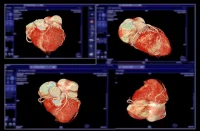The American College of Cardiology (ACC) and the American Heart Association (AHA) have released an updated clinical practice guideline for managing patients with acute coronary syndrome (ACS). The new 2025 ACC/AHA/ACEP/NAEMSP/SCAI Guideline for the Management of Patients With Acute Coronary Syndromes, published in JACC and Circulation, incorporates the latest evidence and updated recommendations aimed at improving patient care and outcomes.
ACS refers to a range of acute cardiovascular conditions caused by sudden reduced blood flow to the heart muscle, often presenting with chest pain, shortness of breath, and dizziness. The conditions include unstable angina and myocardial infarction which can result from the rupture or erosion of unstable cholesterol plaques in the coronary arteries, leading to blood clot formation that obstructs blood flow. Over 800,000 people in the U.S. experience a heart attack each year.
Patients with ACS face the highest risk for both acute and chronic cardiovascular complications, making it essential to stay current with the most recent evidence in this guideline. With the right management, patient outcomes can be improved during hospitalisation and in the long term.
The guideline addresses the management of unstable angina and myocardial infarction, including both non-ST-segment elevation myocardial infarction (NSTEMI) and ST-segment elevation myocardial infarction (STEMI). Recommendations are based on the best available evidence and provide updated guidance for pharmacological and procedural care.
Dual antiplatelet therapy (DAPT), which includes aspirin and a P2Y12 inhibitor, is recommended for ACS patients as it reduces the risk of recurrent MI. However, it may increase the risk of bleeding in some patients. DAPT is advised for at least 12 months post-hospital discharge for patients with a low bleeding risk, while alternative strategies are suggested for those at higher bleeding risk.
The guideline emphasises the radial (wrist) approach over the femoral (groin) approach for percutaneous coronary intervention (PCI) in ACS patients to lower the risks of bleeding, vascular complications, and mortality. Additionally, the latest evidence supports the use of intravascular imaging during PCI, which is now classified as a Class 1 level of evidence A recommendation.
Cardiogenic shock, which occurs in about 10% of ACS patients with acute MI and significantly impairs heart function, is associated with high early mortality rates of 40% to 50%. The guideline stresses the importance of prompt revascularisation and continues to endorse it as a Class 1 recommendation. Recent clinical trial data and new therapies, such as the microaxial flow pump, are also considered, weighing the benefits and risks for each patient.
Secondary prevention is a key focus following ACS, aiming to prevent disease progression, recurrence, or complications. The guideline includes several key recommendations:
- A fasting lipid panel four to eight weeks after initiating or adjusting lipid-lowering therapy to assess response and guide further treatment (Class 1).
- For patients on maximally tolerated statins with an LDL cholesterol ≥ 70 mg/dL, adding a nonstatin lipid-lowering agent like ezetimibe, evolocumab, alirocumab, inclisiran, or bempedoic acid is recommended to further reduce the risk of major cardiovascular events (Class 1).
- For patients with an LDL cholesterol of 55–69 mg/dL on maximally tolerated statins, adding a nonstatin to further reduce risk is considered reasonable (Class 2a).
- Referral to outpatient cardiac rehabilitation before hospital discharge to reduce death, MI, hospital readmissions, and to improve functional status and quality of life (Class 1).
The guideline was developed by the ACC and AHA in collaboration with the American College of Emergency Physicians (ACEP), the National Association of EMS Physicians (NAEMSP), and the Society for Cardiovascular Angiography and Interventions (SCAI).
Source: American College of Cardiology
Image Credit: iStock
References:
Rao SV et al. (2025) 2025 ACC/AHA/ACEP/NAEMSP/SCAI Guideline for the Management of Patients With Acute Coronary Syndromes: A Report of the American College of Cardiology/American Heart Association Joint Committee on Clinical Practice Guidelines. Journal of the American College of Cardiology.










